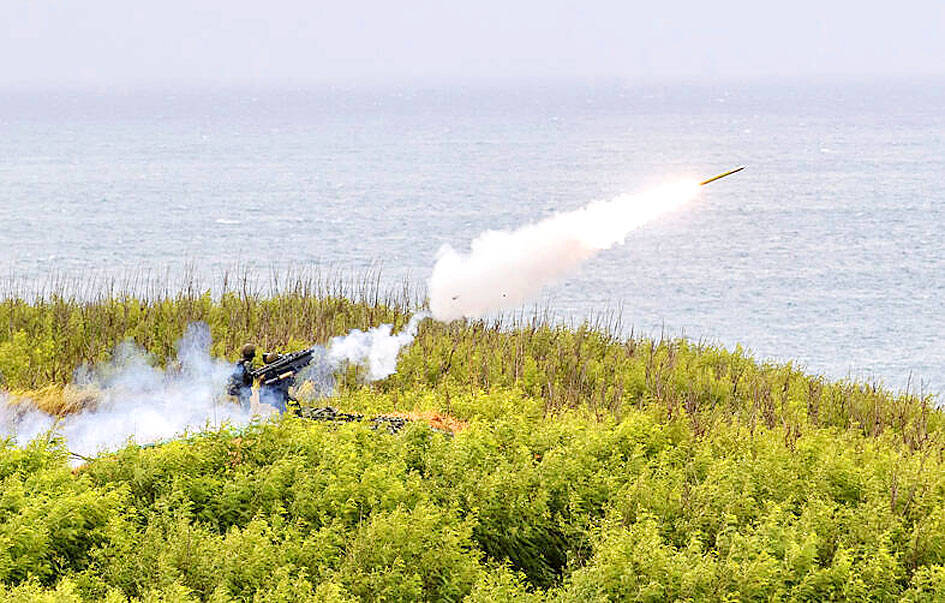The Ministry of National Defense is sending military personnel to the US next year to ensure that the delivery of the FIM-92 Stinger surface-to-air missiles it has procured would be on schedule.
The ministry initially planned to spend NT$17 billion (US$531.4 million) to procure 500 Stinger missiles from the US from 2017 to next year to bolster the military’s air defense capabilities. It later purchased an additional 1,985 missiles in the wake of growing military threats from China.
The additional procurement would increase the budget to about NT$69 billion.

Photo: Military News Agency via AP
The ministry’s budget proposal, which has been submitted to the Legislative Yuan, showed that the first batch of 500 Stingers should be delivered by the end of next year.
The additional 1,985 Stinger missiles should be delivered by 2031, the ministry said.
The ministry also said that the army would dispatch representatives to the US to control the progression and budgeting of its various contracts and to ensure that military equipment would be delivered on time and meet certain quality standards.
The representatives would function as liaison, the ministry said.
The army and the navy would dispatch representatives to the US to participate in a meeting on technical issues involved in the use of Stinger missiles, it said.
The portable air-defense system, with an effective shooting range of about 4,800m, would enable troops to have high mobility. Once procured, it would be used by the army, the marines, military police and troops stationed on Pratas Island (Dongsha Island, 東沙島) and Itu Aba Island (Taiping Island, 太平島).
Meanwhile, the army is to allocate NT$8.36 million to the Armaments Bureau from next year to 2028 to build new 150mm cannon barrels which would be added to M60A3 tanks, to procure 108 M1A2T Abrams tanks and to build new Clouded Leopard armored vehicles, the ministry’s budget proposal showed.
The nation has 460 M60A3 tanks that have been in active duty since the 1990s.
Aside from building new cannon barrels, the ministry in 2022 tasked the National Chungshan Institute of Science and Technology to upgrade the tanks’ gun control, firing control and sighting systems. The project cost NT$444.01 million.
It has also budgeted about NT$7.2 billion to purchase “AVDS-1790-8CR” engines and replace old ones installed on M60A3 tanks. The procurement is to be completed by 2028.

MAKING WAVES: China’s maritime militia could become a nontraditional threat in war, clogging up shipping lanes to prevent US or Japanese intervention, a report said About 1,900 Chinese ships flying flags of convenience and fishing vessels that participated in China’s military exercises around Taiwan last month and in January last year have been listed for monitoring, Coast Guard Administration (CGA) Deputy Director-General Hsieh Ching-chin (謝慶欽) said yesterday. Following amendments to the Commercial Port Act (商港法) and the Law of Ships (船舶法) last month, the CGA can designate possible berthing areas or deny ports of call for vessels suspected of loitering around areas where undersea cables can be accessed, Oceans Affairs Council Minister Kuan Bi-ling (管碧玲) said. The list of suspected ships, originally 300, had risen to about

DAREDEVIL: Honnold said it had always been a dream of his to climb Taipei 101, while a Netflix producer said the skyscraper was ‘a real icon of this country’ US climber Alex Honnold yesterday took on Taiwan’s tallest building, becoming the first person to scale Taipei 101 without a rope, harness or safety net. Hundreds of spectators gathered at the base of the 101-story skyscraper to watch Honnold, 40, embark on his daredevil feat, which was also broadcast live on Netflix. Dressed in a red T-shirt and yellow custom-made climbing shoes, Honnold swiftly moved up the southeast face of the glass and steel building. At one point, he stepped onto a platform midway up to wave down at fans and onlookers who were taking photos. People watching from inside

Japan’s strategic alliance with the US would collapse if Tokyo were to turn away from a conflict in Taiwan, Japanese Prime Minister Sanae Takaichi said yesterday, but distanced herself from previous comments that suggested a possible military response in such an event. Takaichi expressed her latest views on a nationally broadcast TV program late on Monday, where an opposition party leader criticized her for igniting tensions with China with the earlier remarks. Ties between Japan and China have sunk to the worst level in years after Takaichi said in November that a hypothetical Chinese attack on Taiwan could bring about a Japanese

STREAMLINED: The dedicated funding would allow the US to transfer equipment to Taiwan when needed and order upgraded replacements for stockpiles, a source said The US House of Representatives on Thursday passed a defense appropriations bill totaling US$838.7 billion, of which US$1 billion is to be allocated to reinforcing security cooperation with Taiwan and US$150 million to replace defense articles provided to the nation. These are part of the Consolidated Appropriation Act, which the US House yesterday passed with 341 votes in favor and 88 against. The act must be passed by the US Senate before Friday next week to avoid another government shutdown. The US House Committee on Appropriations on Monday unveiled the act, saying that it allocates US$1 billion for the Taiwan Security Cooperation Initiative